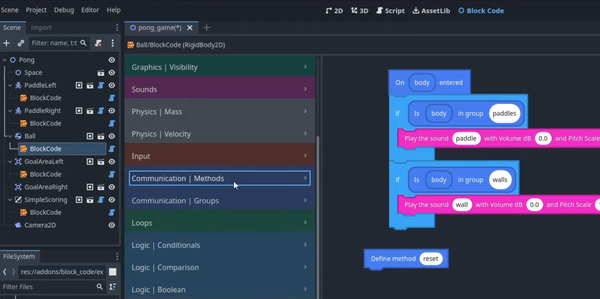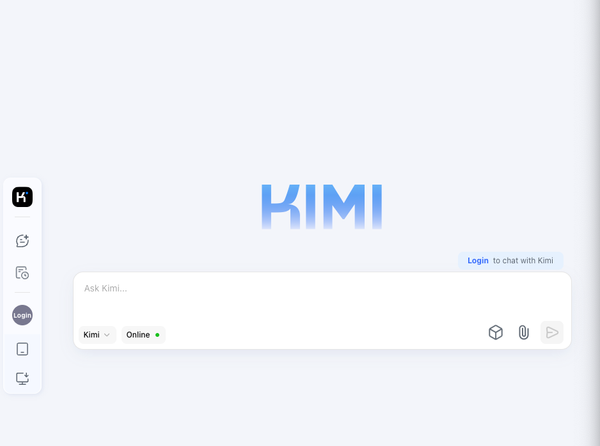Top 15 Open source Video conference and Team Communication Solutions for Windows, Linux, Mac OSX and Phones
Table of Content
Enterprise video conference services are expensive, though they come with ease of use and implementation, the end-user does not own his data. However, there are many enterprise-grade open source alternatives which come with powerful community support of developers and end-users.
Open source alternatives offer many features and integration more than the commercial ones, as most of those features are demanded by the community and developed with the contribution of the community which makes the open source solution more superior to its commercial alternatives.
We published a review for the best self-hosted open-source video conferencing tools you may be interested to read about it here, We also written a comprehensive list for Open-source e-Learning management systems you may be interested in reading it as well.
We have compiled another list for +10 open source instant messengers with end-to-end encryption, you may review it here.
If you are in the U.S. and looking for HIPAA-compliant messengers or LiveChat we have compiled this list for you: Top 10+ HIPAA-Compliant Messaging LiveChat & Telemedicine Services.
Here are our picks of open source video chat and team communications:
1- RocketChat GDPR ready team communication solution
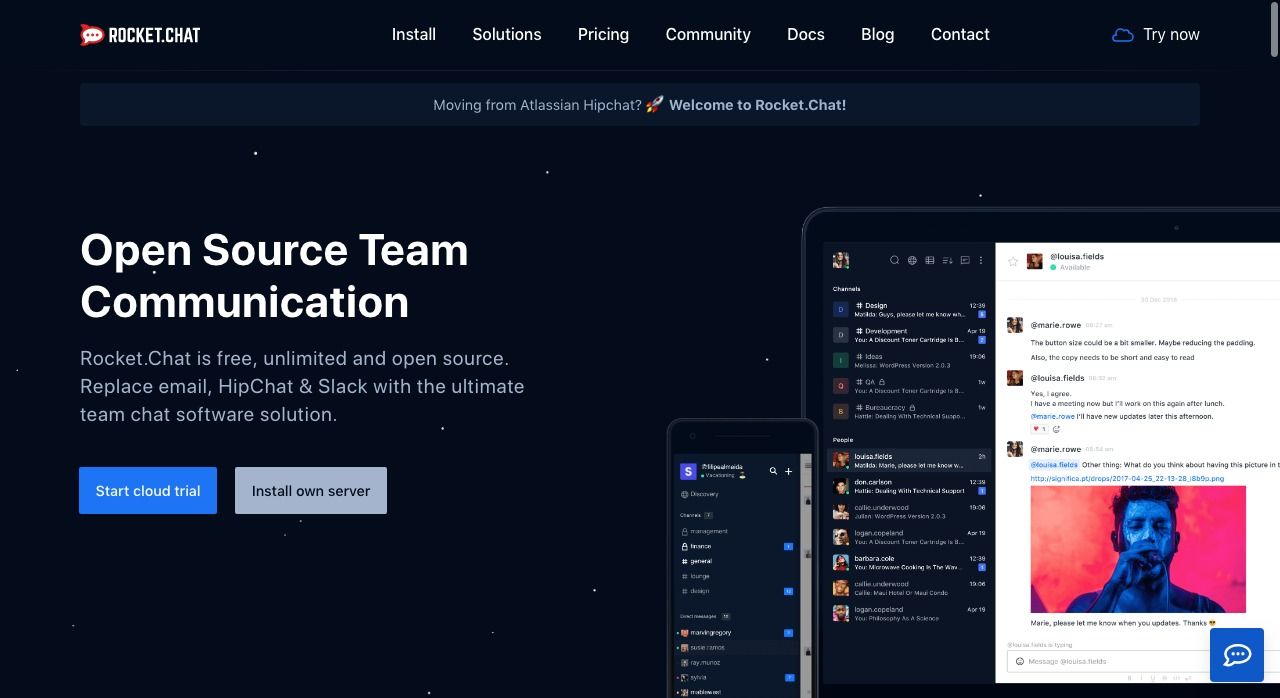
RocketChat is an open source self-hosted real-time communication platform, It is built with Meteorjs and uses MongoDB as the backend.
RocketChat has many features those make it the open source equivalent to Slack, It features include: channels, audio calls, video calls, file sharing, user management, web-hooks, web embedded widget to add it in websites and tags.
RocketChat comes with developer-friendly options which include REST-API and GDPR-ready options to make it usable for EU users.
- GDPR ready
- Developer friendly
- Customer support
- Embeddable Widget
- Guest user support
- Mobile ready
2- Zulipchat: team video conference with +500 apps integration
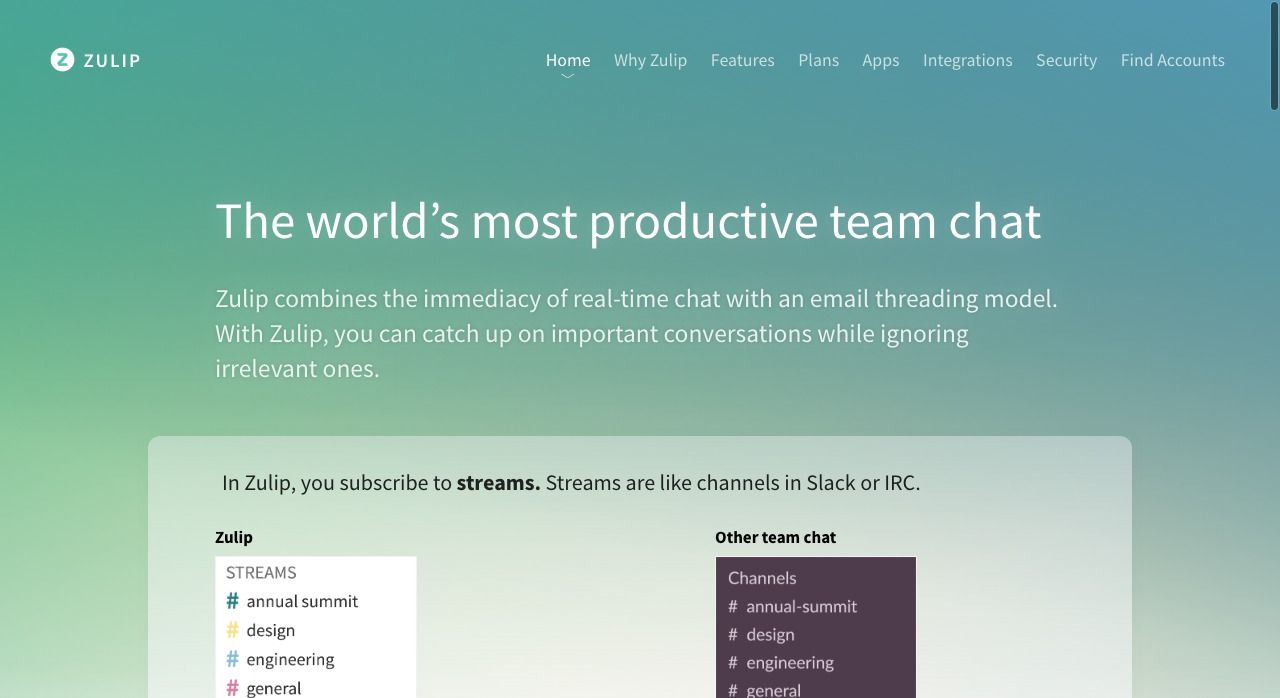
ZulipChat is a self-hosted open source team chat platform, It supports video calls, channels, inline media preview, full-text search, private streams, and importing from other chat platforms.
ZulipChat supports multiple desktop environments as Windows, Linux (Debian, Ubuntu, Fedora & OpenSUSE) and MacOSX. It has native apps for Android/ iOS phones.
Zulip's integration portal has a rich list of apps/ platforms those Zulip play with very well, like social media platforms, productivity apps, communication tools, customer services, project management, and version control.
3- Riot: Decentralized team secure team communication
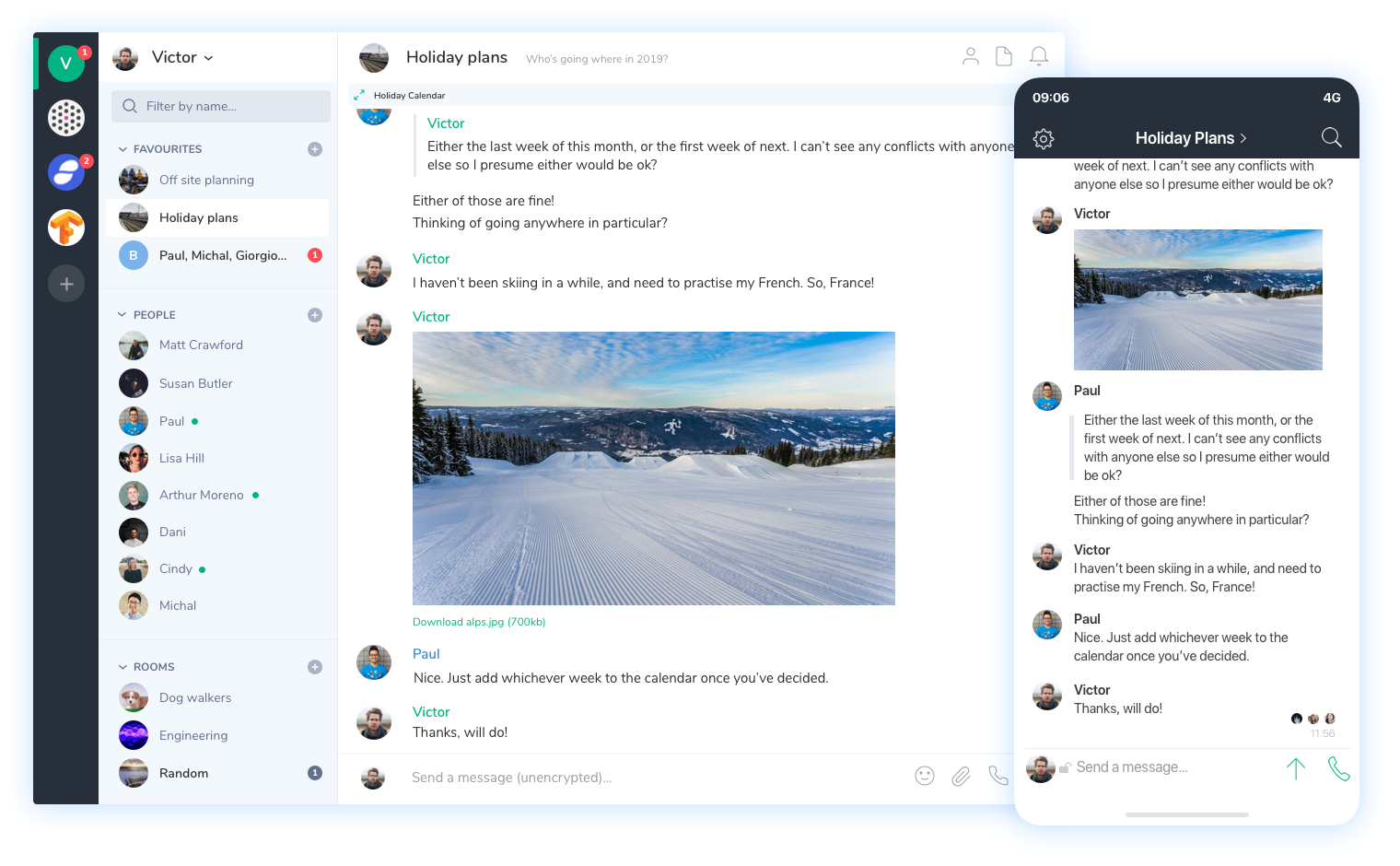
Riot is an Open source encrypted team communication platform built on top of Matrix an open source standard for decentralized communication to provide more privacy and security.
Riot has many clients those support multiple desktop environments (MacOSX, Windows, and Linux) and mobile platforms like iOS/ Android.
This project has been packed and used by many companies, open source projects for team communication/ messaging and millions of users around the world.
- Mobile ready
4- Tox: Peer-to-Peer video conference
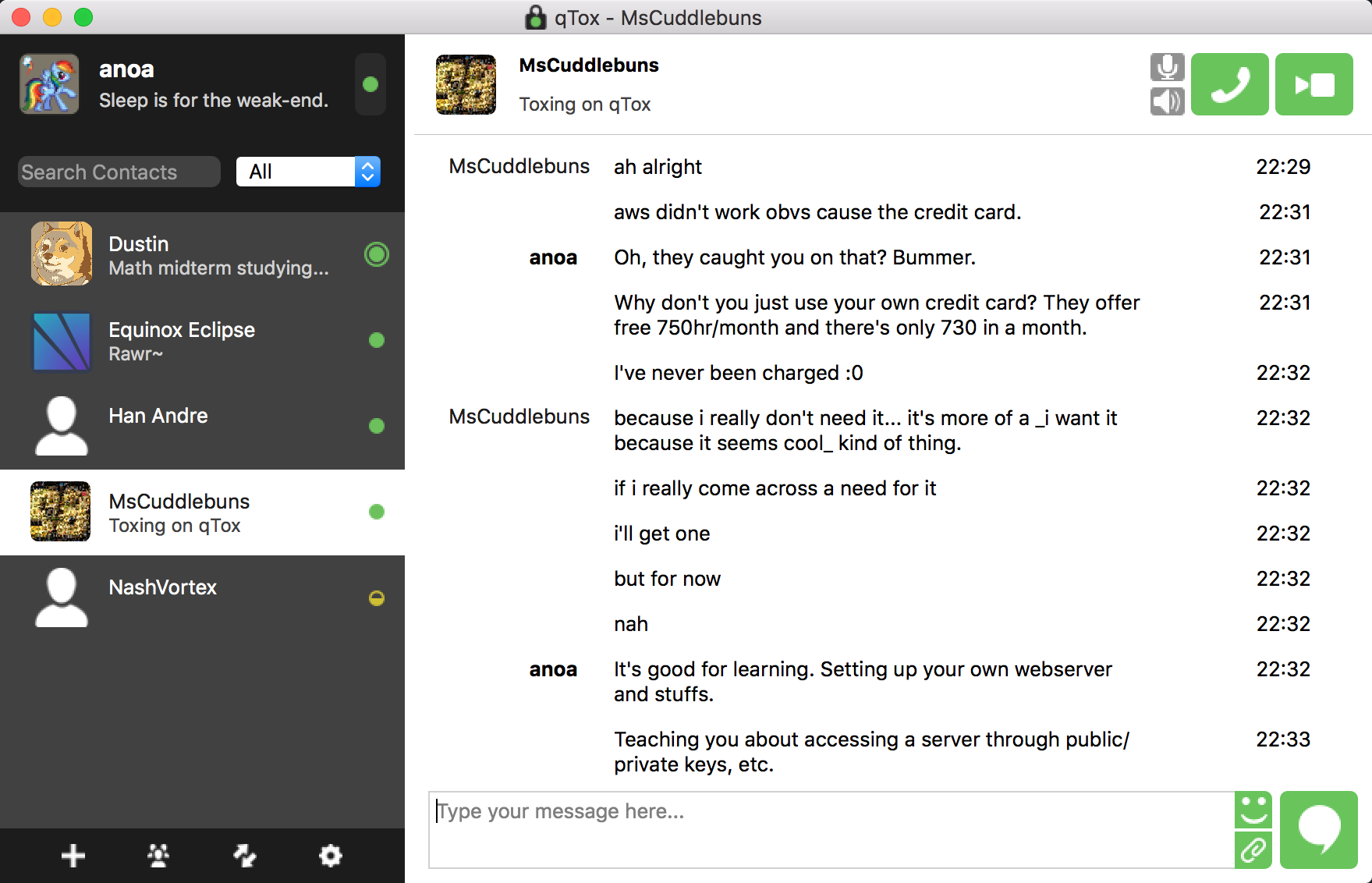
Tox chat is an encrypted free open source peer-to-peer decentralized chat platform, It has many enterprise-grade features as video calls, voice calls, screen sharing, file sharing, and transfer.
Tox has many desktop clients for all known desktop platforms like Mac OSX, Windows and Linux ( Debian, Fedora, Ubuntu, and ArchLinux), It has also an iOS client (Antidote) and Android (Antox) all clients were released as an open source project.
Tox supports group chat which acts like channels but comes with audio calls support which is an amazing feature that resembles PalTalk chat.
Tox advantages:
- Decentralized (No central server required)
- Encrypted
- Totally free
- Multiple clients
- Developer-friendly: Multiple languages binding (C#, Go, Java/Scala, Python, Swift, Rust, Vala)
- Mobile ready
5- Mattermost: Go based team communication
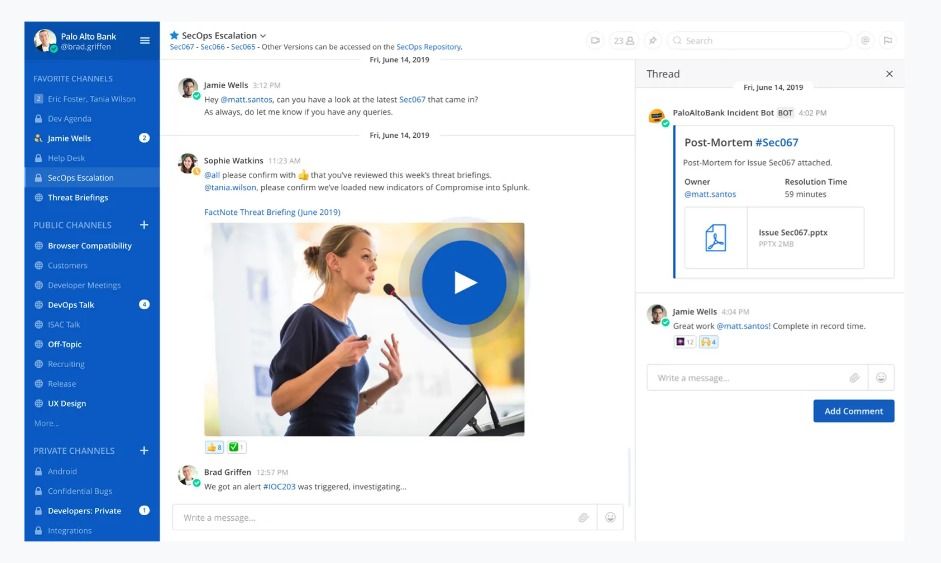
Mattermost is self-hosted team communication/ chat platform that supports video/ voice calls. Mattermost is built using new modern technologies like Go programming language, ReactJS, and uses MySQL or PostgreSQL.
Mattermost's features include: channels, private messaging, inline-media, full-text-search for messages, multi-languages support, files/ images sharing, Push notification, desktop notification.
Mattermost's team provides multiple deployment/ setup options with multi-platforms clients support as MacOSX, Windows, and Linux alongside with mobile apps for iOS/ Android.
This project is quite similar to RocketChat in many aspects including developer tools, bot development and webhooks, the different in here is the stack used for development. However, Mattermost provides a successful use-case for multiple sectors like financial, healthcare, government, security and DevOps sectors.
6- Linphone: Open source Skype alternative
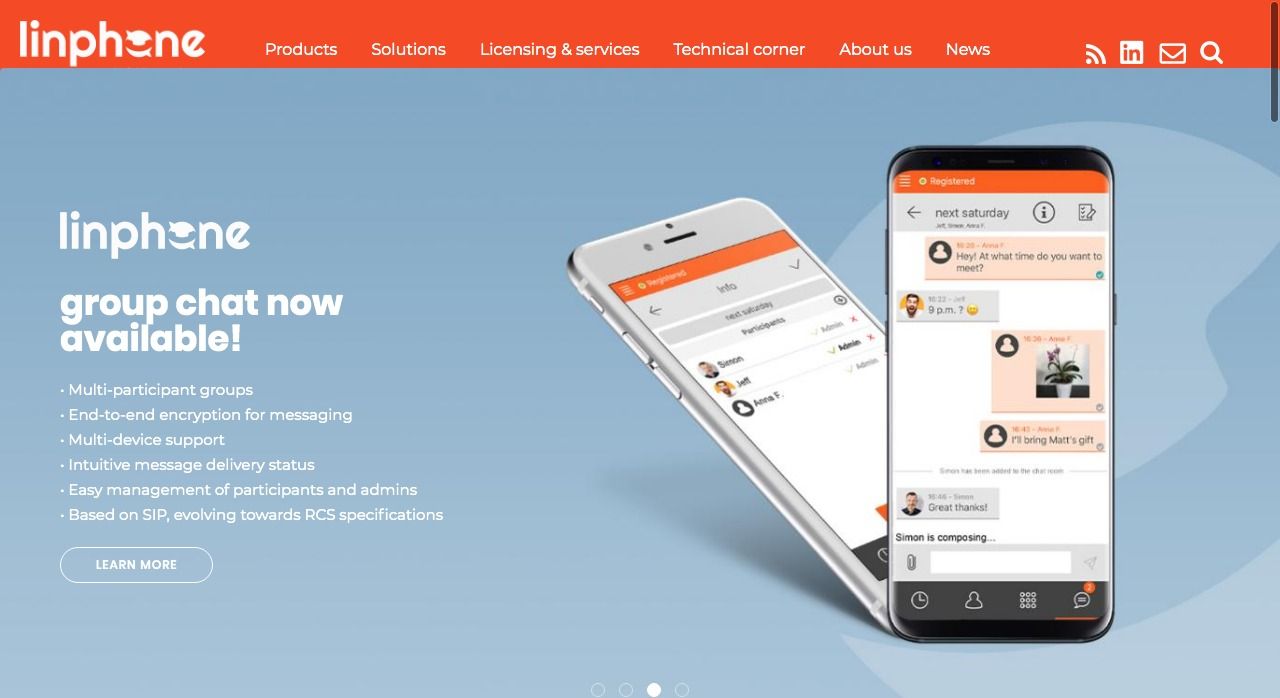
Linphone is an enterprise solution with double license libre (opensource) and commercial for video/ voice calls. It is basically the ideal alternative for Skype on this list. Linphone has native mobile apps for Android/ iOS and desktop clients for Windows, Mac OSX, and Linux as it uses Flatpack so it can be installed easily on Debian, Ubuntu, ArchLinux, Fedora, OpenSUSE, RaspberryPi distros, LinuxMint, and other popular distros.
- VoIP with Video chat
- Skype alternative
- Mobile clients
7- Jitsi: Open source Video conference for Windows, Linux, Mac OSX and Mobile
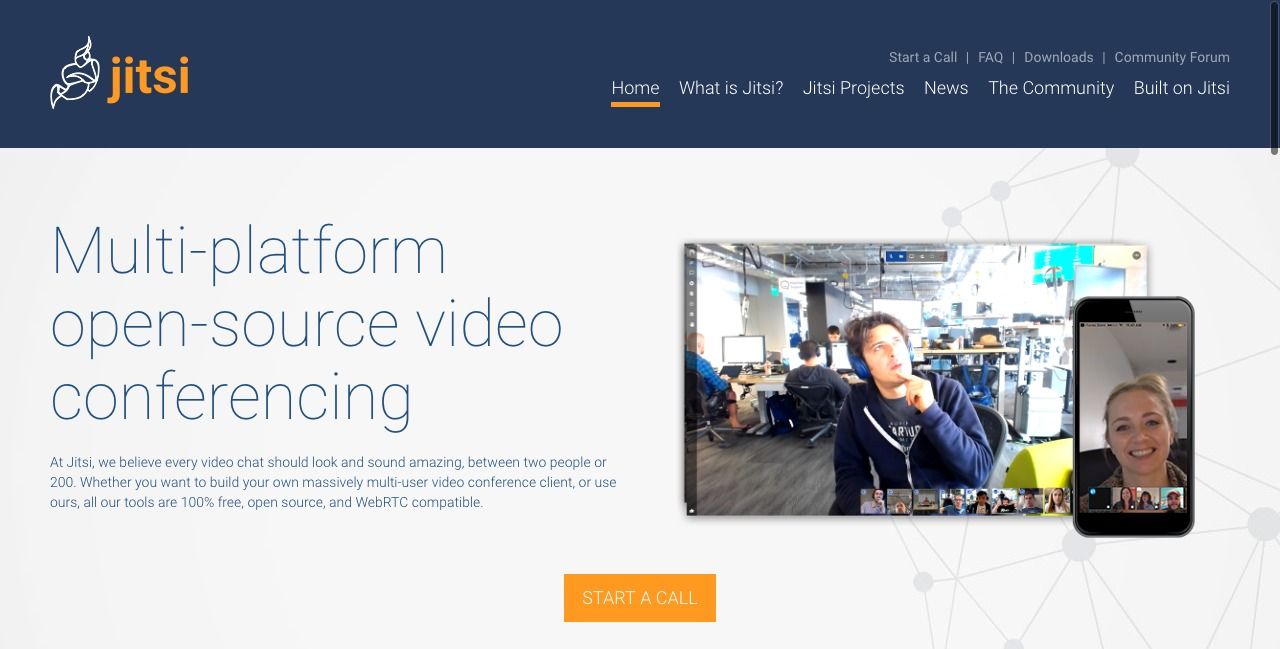
Jitsi is an open source video conferences platform, It supports multiple platforms with powerful native clients including Android, iOS and desktop clients. It has installable packages for Debian and Ubuntu Linux as well.
8- Jami
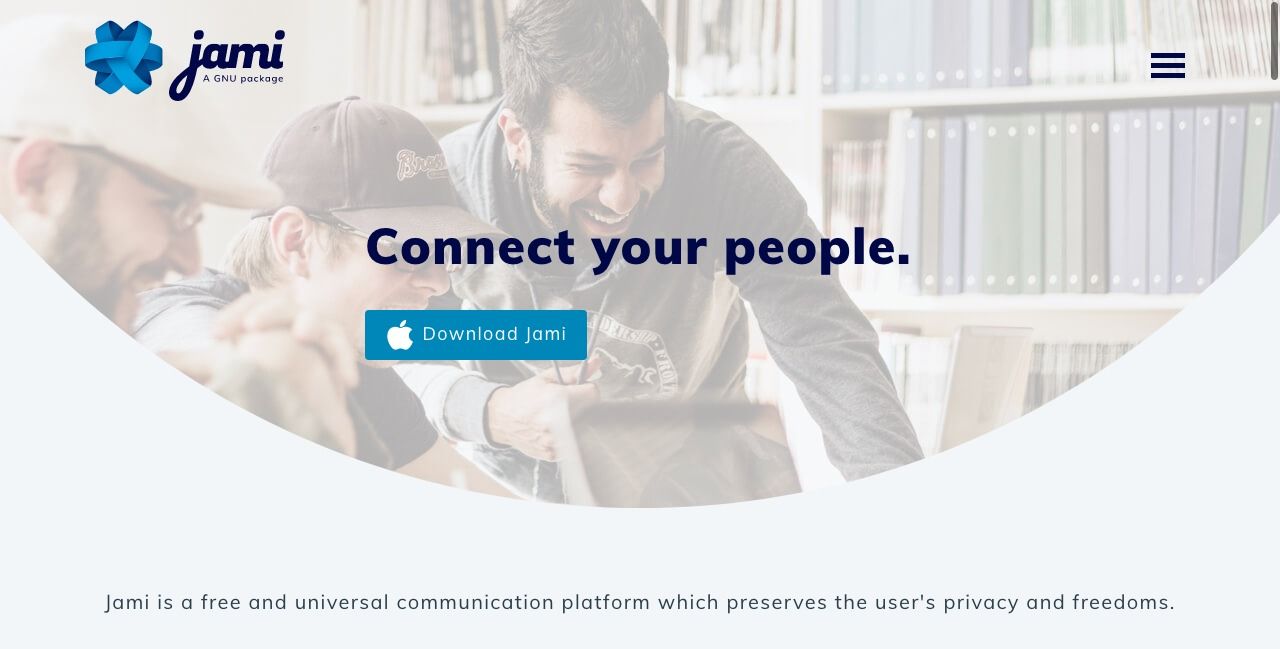
Jami is a distributed open-source communication platform, it supports multiple platforms like desktop, mobile with native apps, completely ad-free, with a set of features to provide the users with highly functional secure and private messaging which includes voice and video calls. Jami also supports large file transfer between peers.
9- Reteroshare; Peer-to-peer secure messaging for family/ teams.
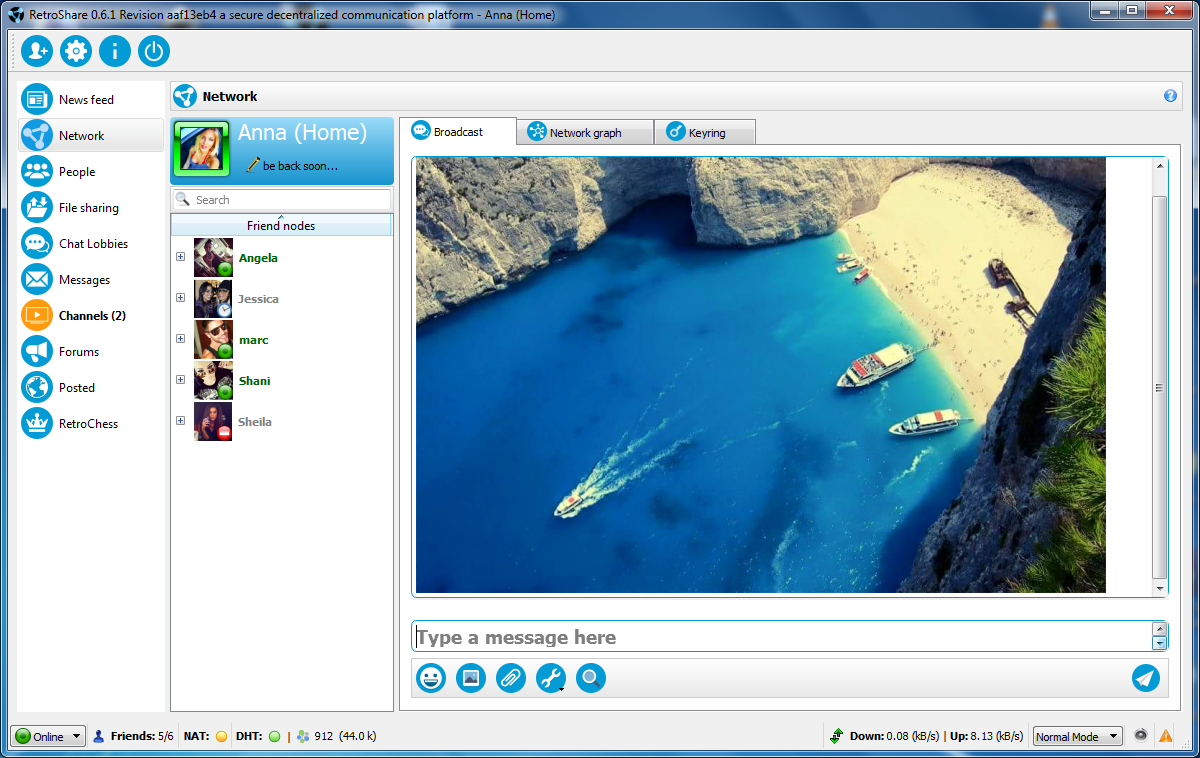
Retroshare is a peer-to-peer platform that includes file-sharing, instant messaging, channels, and supports Voice/ Video chat (experimental features). The user can configure RetroShare to use Tor and/or I2P networks to ensure more security and privacy.
Retroshare clients are available for Windows, Mac OSX, many Linux distributions like Debian, Ubuntu, ArchLinux, Fedora, CentOS, Gentoo, and OpenSUSE, with the support of other un-popular distros.
Retroshare is recommended for friends and family for easy secure communication, but it comes packed with several communication protocols, F2F "decentralized Friend to Friend network", UPnP / NAT-PMP port forwarding support, Tor support which makes it the only project on this list with Tor support though it comes as an option, VoIP, Transport encryption with TLS (OpenSSL), Distributed hash table to locate friends, & options to use dynamic DNS.
RetroShare is extensible through plugins which use its modular architecture and REST-API (JSON API) but there is no public marketplace or ecosystem for its plugins even though it has many users worldwide. But keep in mind Retroshare does not work on mobile yet.
10- Q-municate: Open source WhatsApp alternative

Q-municate: is an open source cross-platform video calling and instant messaging application, It supports Android/ iOS devices with native applications for both and it comes with web client as well. It's Whatsapp open-source equivalent but with more developer-friendly options like SDK for Android/ iOS to build mobile apps for both platforms, REST-API, Windows SDK, and Blackberry SDK.
Q-municate comes with HIPAA-ready options including Chat moderation, auto-filtering, abuse, and data protection compliance.
This project uses a combination of XMPP and WebRTC for instant messaging and video calling. It supports HD video call quality out-of-box with peer-to-peer architecture to reduce latency. Q-municate's team now is working on add video call recording.
Integration with enterprise solutions like Microsoft Lync, SharePoint, and AirWatch is a key feature for Q-municate, but it also comes along with more usable features as SIP, SMS services integration for international calls/ messaging.
- Mobile ready
11- OpenVidu: Open-source Video conferencing Platform

OpenVidu is an open source video chat/ conferencing platform originated from Spain. It's easy to deploy as a self-hosted platform as well as easy to use. It comes with a set of developer tools to allow flexible development and integration with other platforms.
OpenVidu's features include Video-calls recording, Private video conferencing, Messages broadcasting, Screen sharing, and multi-user video calls.
12- Apache OpenMeethings
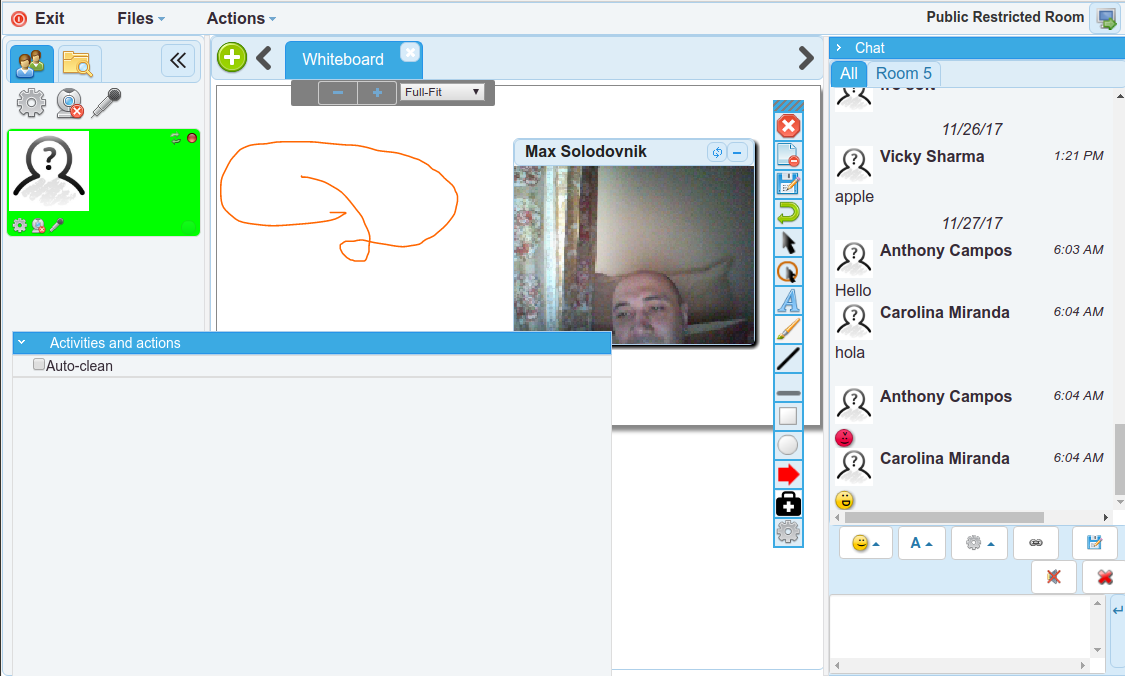
OpenMeethings is an open source video conferencing tool, built to provide teams/ companies with secure, private self-hosted video conference solution.
OpenMeethings comes with many features to support meetings schedules, meeting recordings, screen sharing, whiteboard, file explorer, user management, private messaging, meeting planning and calendars.
OpenMeetings project is released under Apache license, within Apache Apache Software Foundation.
13- BigBlueButton: Video conferencing for education
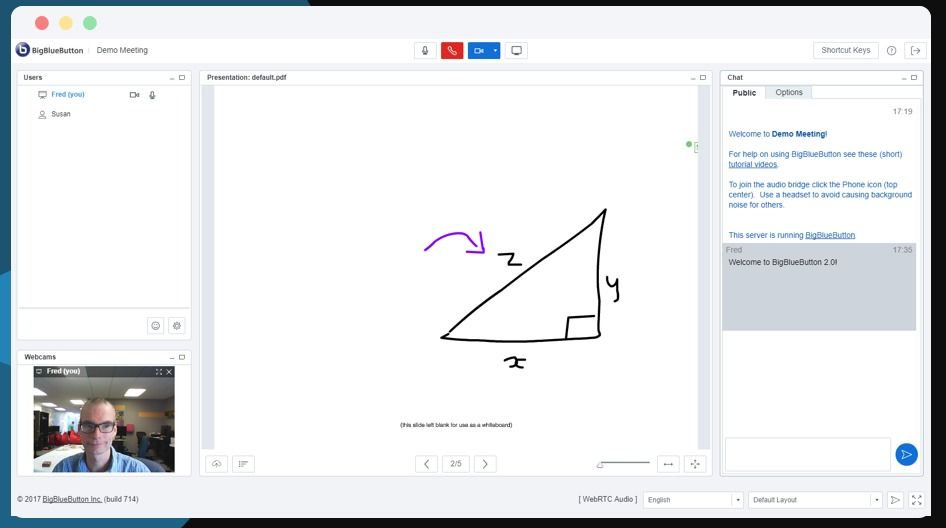
BigBlueButton is a cross-platform open source video conferencing for classrooms, It features whiteboard implementation, screen-sharing, and developer-friendly tools.
BigBlueButton is built for education but it works great as video conference tools, It was the base for MCONF and supported by a large community of developers and users.
14- MCONF
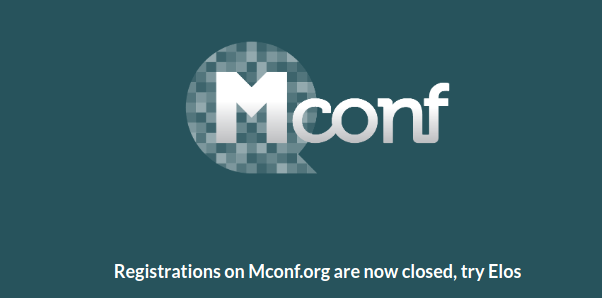
MCONF: is an open-source video conferencing project built on top of BigBlueButton it includes more additional features to BigBlueButton as customizable web portal MCONF-Web. MCONF-Live which contains more of BigBlueButton features and options, and MCONF-Mobile a mobile version of MCONF for Android and iOS devices. Unfortunately, it's not closed.
15- Lynckia
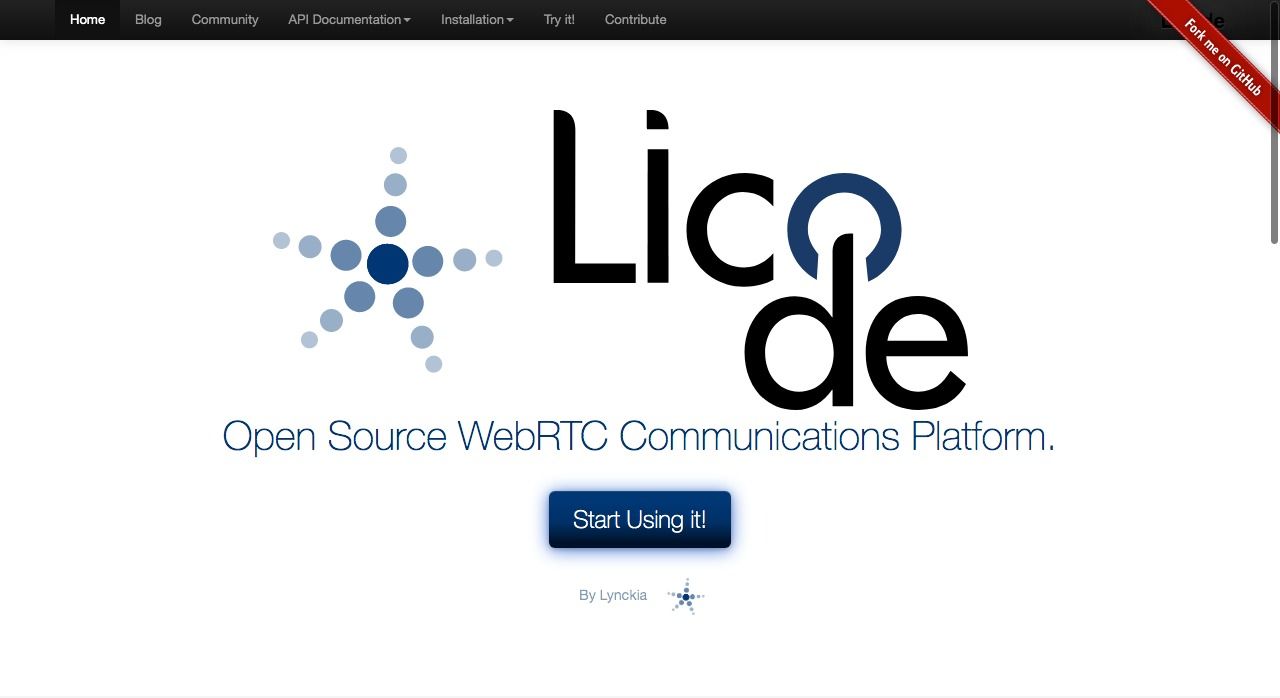
Lynckia is an open source real-time communication/ messaging platform that comes with a set of features to ease real-time video conference, chat, messages streaming, and developer-friendly integration into existing web applications. Lynckia is like many projects in this list uses WebRTC.
Our Open-source Communication software list guide










